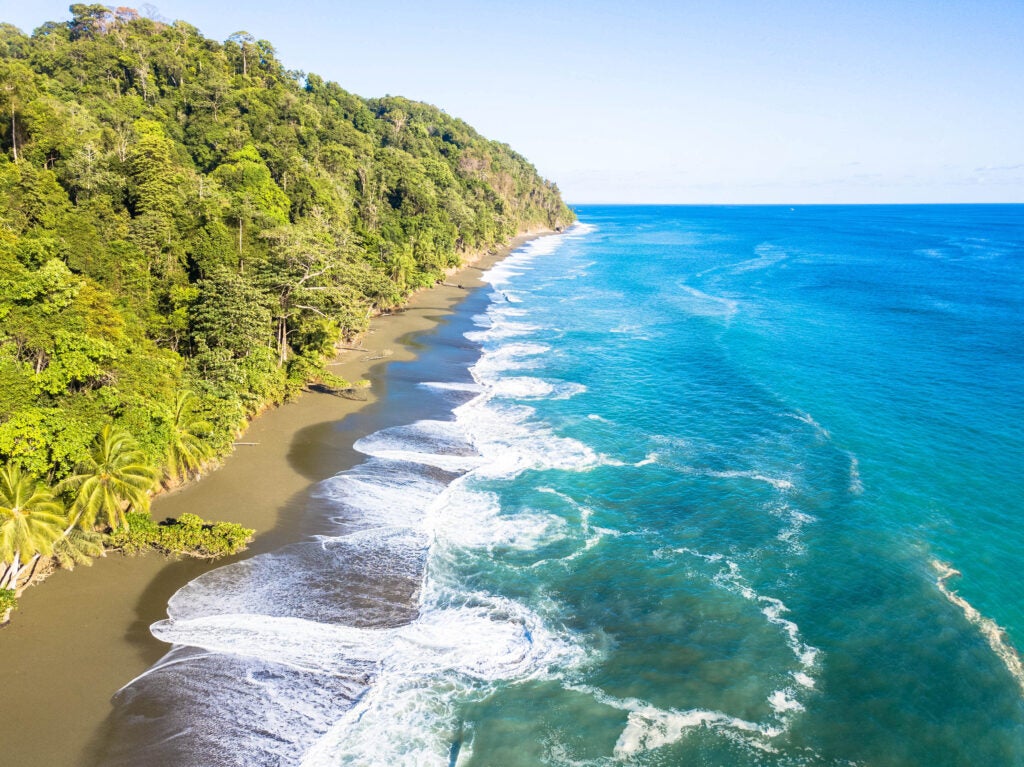Nature is more important than ever to realizing climate goals at COP28

This blog was co-authored by Britta Johnston, Senior Policy Analyst for Natural Climate Solutions at EDF.
Heading into COP28, nature as a climate solution has been making headlines, and rightfully so. Sustainably conserving, restoring, and managing the world’s ecosystems is one of the most powerful tools we have to meet global climate goals.
A recent study finds that restoring global forests where they occur naturally could potentially capture 226 gigatons of carbon, and 61 percent of the carbon storage could come from protecting existing forests.
We are beginning to realize the promise of protecting forests. Another report finds that deforestation in the Brazilian Amazon has dropped by 22.3 percent as a result of active intervention to curb forest loss – the lowest it has been since 2018.
Moreover, advancements in policies and practices to build resilience in boreal and temperate forest ecosystems, along with strategies for mitigating catastrophic wildfire, can ensure these ecosystems remain net greenhouse gas sinks.
Oceans also have climate mitigation potential. New evidence suggests that organisms in the mesopelagic zone, a region of ocean between 200 and 1,000 meters deep containing 95 percent of ocean biomass, may trap millions of tons of carbon each year by feeding in surface waters at night and diving back down in the day.
We have better science than ever before about nature’s role as a climate solution, and signs of progress on very important fronts. That’s why nature must be at the heart of conversation and action at COP28, both inside and outside the negotiation rooms.
Nature in the COP28 negotiations
Within the negotiating room, Article 6 and the Global Stocktake are two issues in the negotiating agenda whose outcome could have far-reaching implications for nature as a climate solution. For any discussion on nature, it is imperative for Indigenous Peoples and local communities to be active participants, and not passive beneficiaries.
Article 6 is the portion of the Paris Agreement that defines the rules for international emissions trading. As Parties finalize remaining guidance over Article 6, it is important that the door remains open for high-quality natural climate solutions to be eligible under Article 6 international emissions trading mechanisms. High quality natural climate solutions (NCS) carbon crediting can help direct and scale financing to critical ecosystems and the Indigenous Peoples and local communities who steward them.
Parties must also ensure that Article 6 is operationalized in a high-integrity, equitable, and transparent manner. Specifically, with Article 6.2, which provides the accounting framework for international emissions trading, Parties should ensure that resulting guidance around reporting, tracking, and reviewing trades enables transparency and quality assurance of Internationally Traded Mitigation Outcomes (ITMOs).
Parties should also consider imposing additional, more stringent requirements to Article 6.2 transactions, such as the principles of the Tropical Forest Credit Integrity Guide, to ensure that only the highest-quality ITMOs are traded.
On Article 6.4, which sets up a centralized mechanism for ITMOs, the Supervisory Body should consider nature-based removals as eligible activities under the mechanism. The majority of existing removals activities are biological in nature and methodologies for these types of removals have already been widely tested and monitored over several decades.
For more on Article 6, read our blog, Article 6 moves to implementation, at COP28 and beyond.
Global Stocktake: The Global Stocktake is a process for countries and stakeholders to assess progress towards meeting the goals of the Paris Agreement. The UN’s recent Global Stocktake Technical Synthesis Report made it clear that the world is not on track to limit warming to 1.5C. The upcoming Global Stocktake offers countries the opportunity to identify gaps and course correct, which nature can help them do.
For the Global Stocktake to enable real and ambitious climate action, Parties must respond by including nature-based solutions in their nationally determined contributions (NDCs) to a far greater extent and drastically scale up implementation of nature-based activities to close the mitigation ambition gap. The Global Stocktake can be an important vehicle to deliver an integrated approach to addressing the climate and biodiversity crises.
Indigenous Peoples and local communities are critical to achieving climate goals: If the global community is to succeed in the fight against climate change, it is vital to collaborate with Indigenous Peoples and local communities (IPs and LCs). IPs and LCs are the owners and stewards of ecosystems we all depend on. Countries must respect their principles, culture, and conservation techniques. At the same time, they must provide IPs and LCs the support they need to develop and implement shared conservation goals and sustain their livelihoods. IPs and LCs must have a voice in the design of climate solutions to ensure effective participation and equitable access to benefits, and that their rights are upheld.
Nature outside of the COP28 negotiations
Outside of the negotiating rooms, EDF’s Natural Climate Solutions team and our partners will be shining the spotlight on our work to scale up finance for and implementation of high-quality natural climate solutions.
Whether inside or outside the negotiations at COP28, EDF along with NGO, government, and Indigenous Peoples and local community partners will advance key objectives related to nature, including:
- Enhancing the effective participation of IPs and LCs in jurisdictional REDD+ and other jurisdictional-scale natural climate solutions;
- Scaling finance and support for jurisdictional REDD+ and other high-quality natural climate solutions through partnerships and catalyzing technical support; and
- Advancing understanding of the benefits of mesopelagic species to the planet and the role of management in conserving these benefits.
All eyes will be on COP28 as leaders convene to get the world back on track to meet the goals of the Paris Agreement. Conserving, restoring and sustainably managing the world’s diverse natural systems can play a critical role in combating the climate change crisis. To turn words into action, we must support the right policies and drive the right practices, and we encourage all stakeholders to lean in together to drive progress at COP28 and beyond.
Join us at COP!
If you’ll be in Dubai, or tuning into COP28 remotely, please join our Blue Zone programming:
Effective Participation of Indigenous Peoples and Local Communities in Jurisdictional REDD+
December 3, 11:00-12:00 | Nature Positive Pavilion, Blue Zone
This session will dive into several examples of the effective participation of IPs and LCs in jurisdictional REDD+ in Central America, South America and Central Africa. Panelists will share their experiences in several tropical forest countries, like the effective participation of IPs and LCs in the development of the TFCI Guide and the partnership to develop a module to certify the socio-cultural benefits of forests and REDD+ programs under the Architecture for REDD+ Transactions.
Indigenous Peoples and local communities participating as partners in REDD+
December 6, 18:30-20:00 | Side Event Room 1
This panel will include a presentation of a) the experience of IP and LC organizations participating as partners in the development of REDD+ certifications with the Architecture for REDD+ Transactions and b) the REDD+ Indigena Amazonico (RIA) in the Communal Reserves in the Peruvian Amazon.
Jurisdictional REDD+ Perspectives: Progress on scaling finance and support for forest conservation
December 8, 08:30-09:30 | Nature Positive Pavilion, Blue Zone
Halting and reversing deforestation by 2030 will require high-integrity approaches to forest conservation. To accomplish this, jurisdictions need to be empowered to design and implement impactful JREDD+ programs and generate large-scale mitigation results. This panel session will bring together the NGO community and country representatives to highlight progress with several jurisdictional scale REDD+ initiatives, showcasing lessons learned and perspectives on the path forward to continue catalyzing urgent finance and support needed for forest conservation at scale.
Celebrating a New Partnership to Accelerate Jurisdictional REDD+ Success
December 8, 17:00-19:00 | Nature Positive Pavilion, Blue Zone
Trailblazing forest nations are pursuing ambitious and impactful pathways to protect and restore forests through high-integrity jurisdictional REDD+ programs. Join us for a reception to celebrate a new initiative aiming to align technical support for the critical efforts of these leaders with the rapid pace and scale needed to realize ambitious global climate targets.
Valuing the treasures of the Twilight Zone: mesopelagic species and their delivery of biodiversity, climate, food and other services
December 9, 09:00-10:00 | Nature Positive Pavilion, Blue Zone
The extremely abundant species of the mesopelagic realm are one of the ocean’s most undervalued treasures. Comprising an astonishing array of biodiversity that may represent 95% of global marine biomass, they play a critical role in ecosystem functioning and are viewed as a potential replacement for dwindling sources of fishmeal and fish oil. However, their potential to help address climate change via movement of fixed carbon into the depths has only recently become a focus of ocean research – there remains much we need to learn to ensure a precautionary approach that includes climate dynamics is fully incorporated before considering any new targeting of these species for industrial exploitation. We must fully evaluate the benefits they can provide humans and nature both in and out of the water and use this information to set up regulatory frameworks to help guide how the world’s nations value and use mesopelagic species to balance ecological and human needs. This panel will discuss what science suggests are the greatest benefits of mesopelagic species to the planet, the role of management in conserving these benefits, and ways to ensure we make the most of this resource.
Jurisdictional REDD+ Benefit Sharing Mechanism and their Impact on Indigenous Peoples and Local Communities in Ecuador and Costa Rica
December 9, 15:00-16:00 | One Planet Pavilion, Blue Zone
In this panel, EDF will share its experience leading the design and validation of benefit sharing plans in the Jurisdictional REDD+framework with the support of countries, such as Ecuador and Costa Rica, plus other organizations including NGOs and IP and LC organizations, to support jurisdictions in their REDD+ programs. The benefit sharing plans are intended to serve the different stakeholders (Indigenous Peoples, local communities, governments and other actors) as a guide for the implementation and monitoring of benefit sharing mechanisms (monetary and non-monetary) in the implementation of emission reduction activities within REDD+ programs in each country.
How can carbon finance create opportunities for Indigenous peoples and local communities?
December 11, 11:10-12:10 | Indigenous Peoples Pavilion, Blue Zone
Indigenous peoples (IPs) and local communities (LCs) have historically not been adequately represented, actively involved in or given leadership of conversations nor had access to or shared the benefits of carbon finance and carbon markets.Since COP27, concerns have arisen about the benefits from VCM to IPs and LCs, the compliance to their rights, vision, culture, as well as their inclusion as partners and into decision-making processes affecting them. It’s essential to ensure that carbon finance is benefitting IPs and LCs.
This session will focus on how to enhance IP and LC engagement, leadership and involvement in decision-making on carbon markets. Examples of work done by projects and programs with leadership from IPs and LCs, including on land rights, improving livelihoods, strengthening community governance, and respecting traditional lifestyles, among other things, will also be showcased.
Full event calendar: EDF at COP28













One Comment
terima kasih infonya menarik bgt